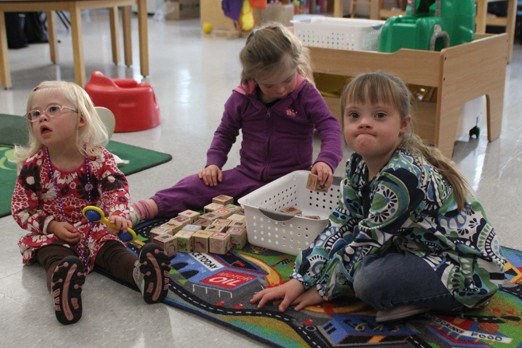Brian Lawson’s two-year-old daughter, Teija, is just his little girl.
“She runs around, laughs and giggles just like any other girl,” he said. “She has tea parties with her daddy. She likes to play with her dolls.”
Teija was born with Down syndrome. But she is more similar to other children than different, her mother, Jennifer, added.
“She loves Sesame Street. She loves music. She loves Elmo. She loves potato chips,” she said.
Children with Down syndrome are children first and in most ways are no different than other children; that’s the message a group of local families want to convey during National Down Syndrome Awareness Week, which kicks off Nov. 1 and runs until Nov. 7.
Cindy and Steve Harasen have three children – Max, 12, Kyra, 10, and Kaleigh, 7. Kaleigh was born with Down syndrome and while Cindy said raising a child with Down syndrome isn’t perfect or easy, there is no normal when it comes to raising kids.
“Raising kids is a fulltime job; it’s the hardest job ever,” she said. “I have friends and sometimes I hear about what the stuff they are going through with their children and think ‘I’ll take my little girl with Down syndrome over that any day.’”
Down syndrome is a naturally occurring chromosomal arrangement; one in every 800 babies is born with Down syndrome in Canada.
Parents can have prenatal testing done in the second semester to test for Down syndrome. Cindy Harasen said she knows, through the Canadian Down Syndrome Society, that the majority of women who test positive and choose to terminate their pregnancies don’t first speak to a family with a child with Down syndrome.
“That is not an informed decision,” she said. “I think that is completely irresponsible of the medical profession to give that information to people but give them no other information or guidance for making the decision.”
“It presents it as if Down syndrome is this really horrible thing that you better test to find out if you have it because you want to make the right decision,” she added.
“They give you the scary stuff,” said Veronique Lavoie Desrosiers.
Desrosiers has two daughters, Julianne, 16 months, and Annabel, 4, who has Down syndrome.
“Come spend a weekend with me, then make your decision,” she said.
All three families meet once a month during a support group at Sherbrooke Public School.
It’s a time for parents to share information, meet with each other and have fun with the children, said Debbie Bennett, an infant child development worker for the Children’s Centre Thunder Bay’s early intervention program.
Bennett said there has been great progress over the years in decreasing the stigma of Down syndrome.
“We are very lucky to live in the age we live in; it wasn’t that long ago that parents who had children with Down syndrome were given no hope,” she said. “They were recommended to put the child in an institution, that they would never get an education, they would never hold a job.”
“Over time we have really proven that to be wrong. We live in an age w here children go to school, they go to high school. They go to college. Some individuals with Down syndrome marry,” Bennett added.
Through the early intervention program, children receive speech language pathology, physiotherapy and occupational therapy.
“That really sets them on their way to solid development,” said Bennett.
For more information visit www.cdss.ca.
Sign in or register
- Messages
- Post a Listing
- Your Listings
- Your Profile
- Your Subscriptions
- Your Likes
- Your Business
- Support Local News
- Payment History
Registered Users
Already have an account?
New Users
Create a free account.
